Setting Up a Self-Sufficient Chicken Coop
Do you want to raise chickens in your backyard but fear you do not have enough time to take care of them? If so, this guide on setting up a self-sufficient chicken coop will help you take the first steps to chicken ownership!
Raising chickens doesn’t need to take all your time every day, there are things you can do and tools you can use to put some of their care on auto-pilot. This guide will list each one out and give an overview of how they work.
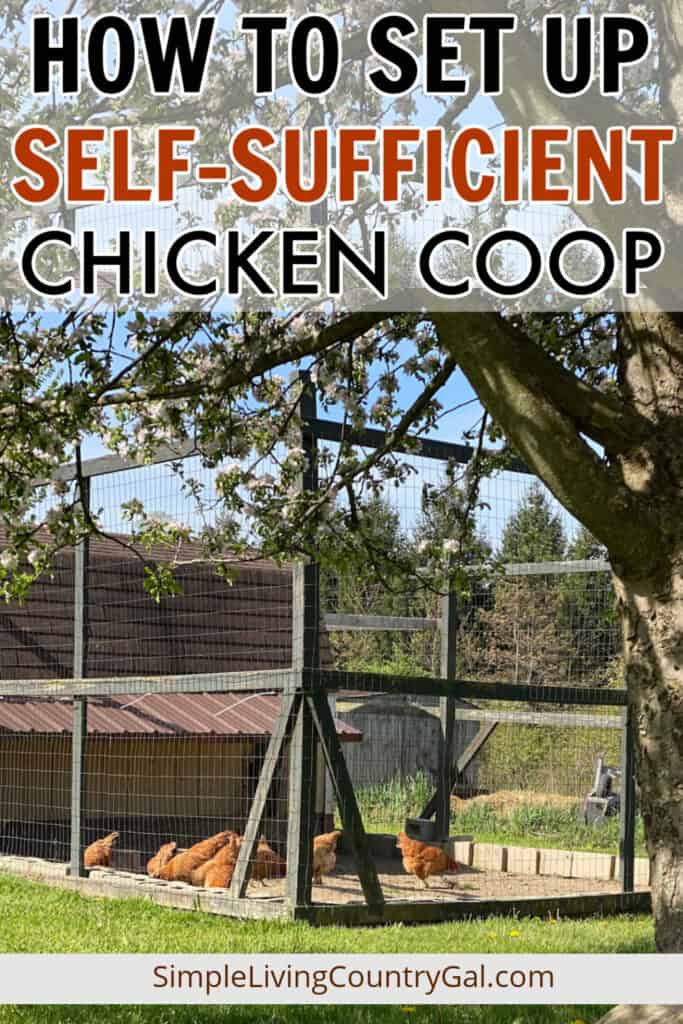
Homesteading is something more women are trying out, but sometimes the chores and the work that come with it can be a bit intimidating. For many, particularly midlife women and empty nesters, the dream of self-sufficiency often takes a back seat because of the fear of time and physical limitations.
I completely understand because I am one of those women. An empty nester with a bad back and that means if I want to raise chickens I must have things setup in a way that allows me to raise them without risk of injury.
Over the years, I have added different tools to our backyard coop and set up shortcuts, reducing my trips to every other day. Can your chickens fend for themselves? They sure can, and I can’t wait to show you how!
My goal is to help women live a more self-reliant lifestyle, no matter their age or any pains they may be dealing with.
Let’s get ready to raise some chickens!
Can Chickens Ever Be Truly Self-Sufficient?
While we can’t quite teach our hens to cook or clean, there are ways to encourage them to thrive without daily care from us. Up next are a few of my favorite tools that we use with our flock and in our coop. They really help to create an environment that is safe and where our chickens can thrive and fend for themselves.
Be sure to grab the FREE Self-Sufficient Coop Checklist below!
Setting Up the Continuous Feeder
A continuous feeder uses gravity to drop feed into a troth at the bottom of the feeder. These feeders hang up off the ground, ensuring that the grain inside stays free of debris or manure. You can purchase a feeder like this online in metal or plastic. We prefer to use plastic as it seems to hold up better in our wet climate.
Tgeyd Chicken Feeder and Chicken Waterer Set (3 Gallon/26 Pounds) – Hanging Automatic Chicken Feeder No Waste – Chicken Coop Accessories – Poultry Waterer with

How Does it Work?
These feeders operate on a simple principle: as food is consumed, gravity ensures that more is released from the storage container into the feeding area, maintaining a constant supply to the flock.
Installing an Automatic Waterer
An automatic waterer works the same way as a feeder, giving your chickens a large supply of water that will last a few days.
How does it work?
This type of waterer has different ports, so more than one chicken can drink at a time. There is an attachment for your hose, allowing water to come in as needed. There is a float valve inside that keeps the waterer from overflowing ensuring the inside of the coop stays dry.
As with the feeder, you will need to suspend the waterer from the ceiling to ensure the water stays clean and manure-free.
Weekly Cleaning Tips
Despite their convenience, automatic waterers need regular maintenance to prevent algae and bacteria build-up. Plan a weekly spot check and cleaning to keep your waterers running smoothly.
Solar Lights
You can also install solar lighting inside of the coop for your chickens that is on timers and turns off after a set time. This can be helpful for getting your chickens to come inside the coop before it gets too dark outside.
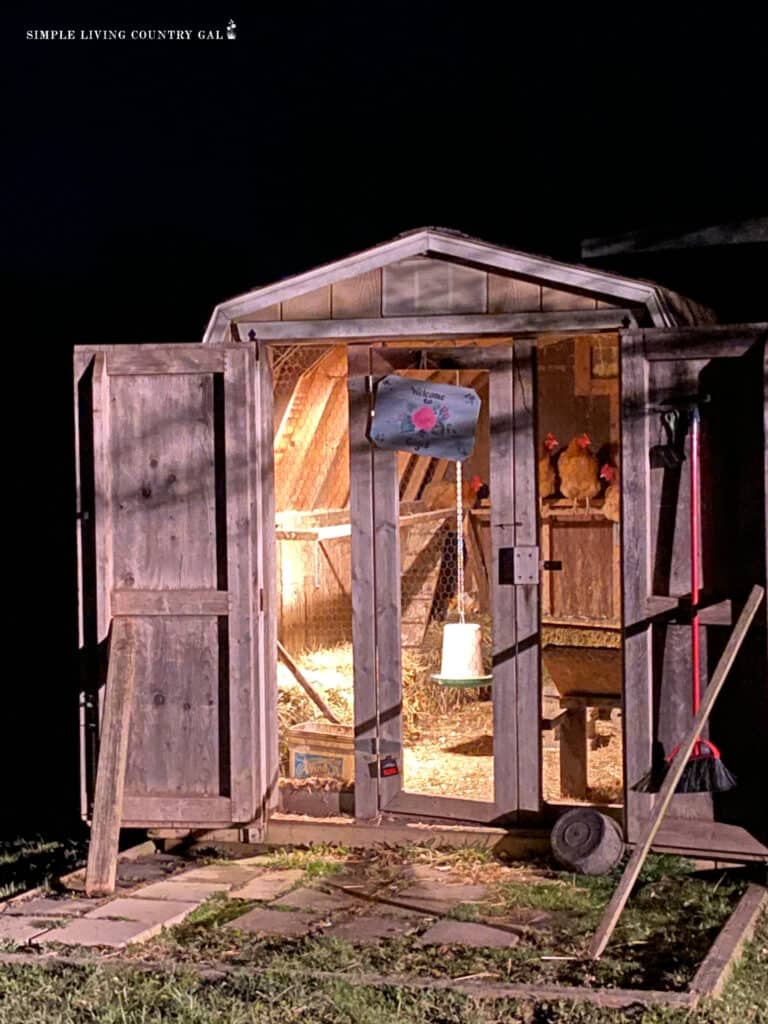
Using Solar Powered Coop Door
One of my favorite additions to our self-sufficient coop is our automatic chicken door. This was a cost investment but a game changer that has saved me so much time and energy.
A solar-powered coop door offers hands-free access, ensuring your chickens can be safely secured without manual intervention or need of electricity.
There are several options on the market. Farm Lite makes the one we use, but they are currently unavailable. My advice is to do some research and read the reviews before buying.
RUN-CHICKEN Door (Brown) Solar Powered Automatic Chicken Coop Door, Battery Operated, Programmable Electric Chicken Run Door Opener with Timer, Light Sensor, Solar Powered, Eternal+


A few tips when using an automatic coop door:
- If the door isn’t closing, the sensor may have gotten muddy. This happens quite a bit where we live, especially in the spring. You can put an overhang to help keep this area dryer.
- These doors have a timer so instead of relying on the light to set the trigger you can pick a specific time you want it to close or open.
- In the beginning, you may have a hen or two get stuck outside. We kept an eye on our hens as they learned the timing, and after about a week, everyone knew to get in the coop before dusk.
Predator Prevention
Ensuring your chickens are protected is an important part of a self-sufficient coop. Use these tips to keep your hens safe.
What predators go after chickens?
Some common predators that may go after chickens include:
- Foxes
- Coyotes
- Raccoons
- Hawks and other birds of prey
- Snakes
- Dogs (both domestic and wild)
- Skunks
Other animals, such as opossums and weasels, will leave the chickens alone but will go after any eggs in the coop.
Incorporating a Rooster
Our top choice for protection is having a rooster. Roosters are very effective at keeping a flock safe. They will watch over the hens and alert them if they see any threats. This is helpful for the chickens as well as us as owners. I have learned that if my rooster is crowing, I need to go out and investigate.
motion Solar Lights and predator lights
Motion sensor solar lights are helpful at night and can alert you if any animals are snooping around the coop. Another helpful tool are these predator lights. These lights blink a red flash of light throughout the night, and they help to keep animals away from the coop. We have one at the entrance of the coop as well as the run.
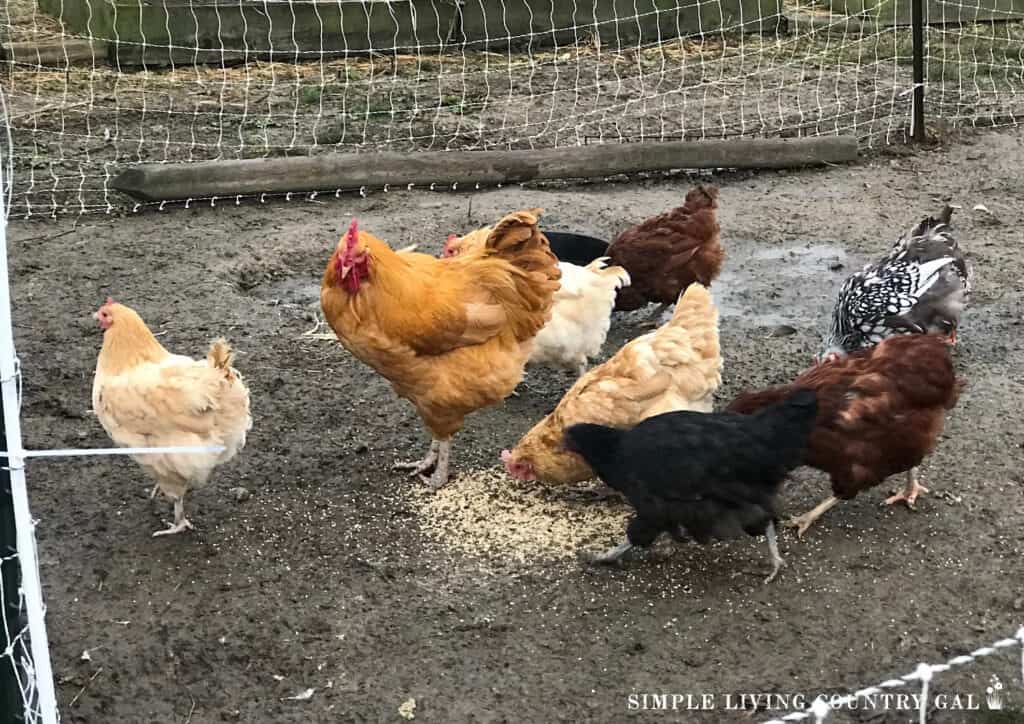
Bonus Tips
Let’s look at a few bonus tips you can incorporate into your self-sufficient coop.
#1. Protecting Your Chickens from the Elements
Ensuring your coop keeps your chickens dry is an important part of raising healthy and happy chickens. You will also want to have protection from the weather outside in the run. This can be in the form of an overhang, or you can hang a tarp. Just enough to allow your chickens to get out of the rain, snow, or hot summer sun.
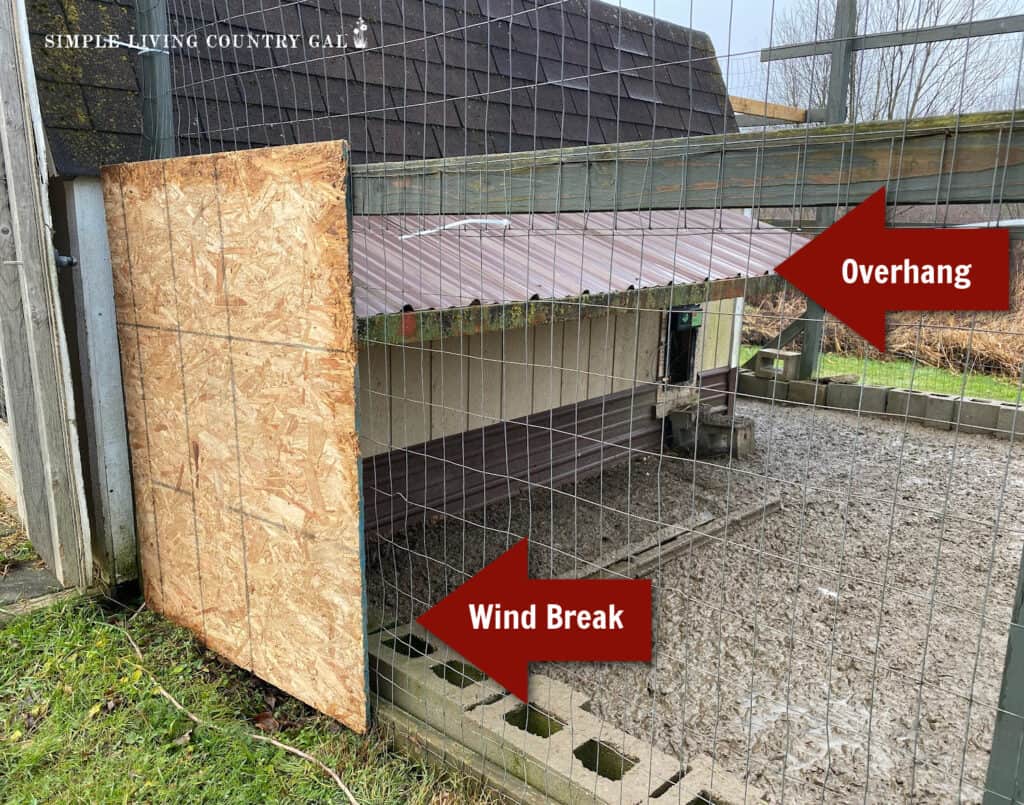
#2. Ventilation
Good ventilation is an important part of a coop and something that tends to get overlooked. Ventilation helps keep dust and smells to a minimum, supporting better health in your flock.
You can install a vent at the top of your coop to allow fresh air to come in without it being a draft.
#3. Scrape Boards
To help keep cleaning to a minimum, you can incorporate scrape boards in areas where manure tends to build up. This is usually under the roost area. Be sure to use boards that are small enough to lift without straining. Scrape boards catch manure, allowing you to remove the board and scrape it clean before putting it back into place. This is a great shortcut and will help to keep your coop cleaner.
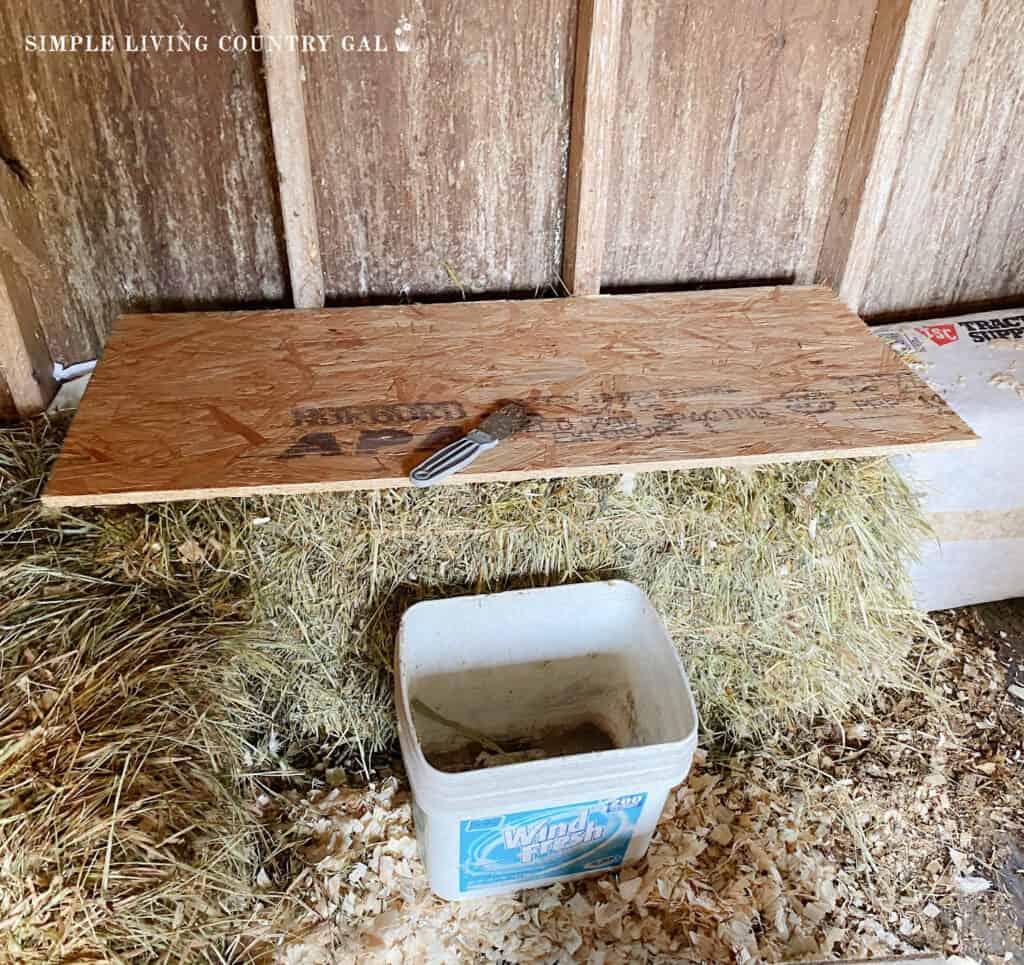
#4. Free-Ranging
Encouraging your chickens to free-range can provide them with essential nutrients and reduce your feed costs. Free-ranging also allows your chickens to forage naturally which reduces stress in a flock.
In a self-sufficient coop, you can allow your flock to free-range on days you are close to home so you can watch over them. I let our chickens out 2-3 times a week. I find that this is enough to keep the flock happy without tying me to the coop to watch over them.
By implementing some or all of these strategies, you can create a flock of chickens that is independent, reducing the need for daily care. Add a few chickens to your backyard and enjoy the benefit of farm fresh eggs.







